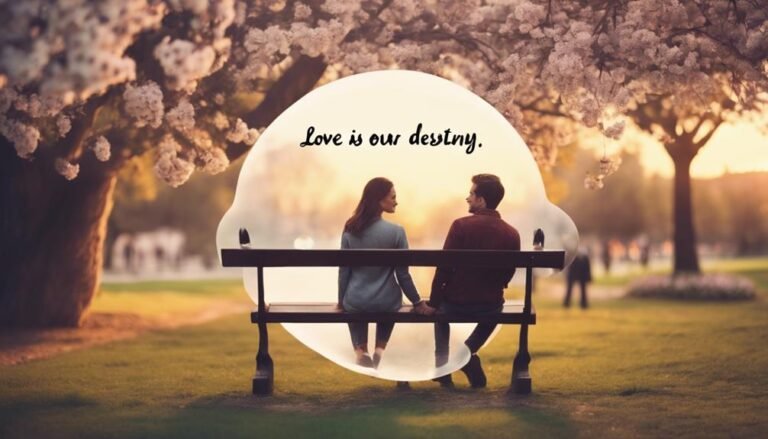Famous Literary Quotes on Love

Immerse yourself in the wisdom of timeless literary quotes that capture the nuances of love. From Shakespeare's sonnets that eternalize passion to Austen's astute observations on societal constraints in romance, each quote explores the complexities of the human heart. Brontë's haunting portrayal of intense love in 'Wuthering Heights,' Neruda's evocative poetry resonating with intense emotions, Fitzgerald's exploration of heartbreak amid societal pressures, and Hugo's depiction of redemption through selflessness—all offer profound insights into the multifaceted nature of love. Let these quotes spark a journey into the intricate tapestry of emotions woven in classic literature.
Key Takeaways
- Shakespeare: "Love looks not with the eyes, but with the mind."
- Austen: "I cannot fix on the hour, or the spot, or the look or the words, which laid the foundation."
- Brontë: "Whatever our souls are made of, his and mine are the same."
- Neruda: "I love you without knowing how, or when, or from where."
- Fitzgerald: "I fell in love with her courage, her sincerity, and her flaming self respect."
Shakespeare's Sonnets
Have you ever explored the intricate world of Shakespeare's Sonnets and investigated the depth of love portrayed within them? These poems are a proof to unrequited passion and eternal devotion, capturing the essence of love in its purest and most complex forms.
In Sonnet 18, Shakespeare immortalizes his beloved, comparing them to a summer's day, highlighting the everlasting nature of true love. The theme of unattainable affection is prevalent in Sonnet 29, where the speaker laments his misfortunes yet finds solace in thoughts of his beloved.
Shakespeare delves into the domain of eternal devotion in Sonnet 116, declaring that true love is unwavering and transcends all obstacles. The poet's words resonate with readers, emphasizing the enduring power of love.
Despite the challenges and heartaches depicted in these sonnets, the underlying message is one of resilience and unwavering commitment. Shakespeare's sonnets continue to captivate audiences with their poignant exploration of love's complexities, making them timeless classics that touch the hearts of all who immerse themselves in their profound verses.
Jane Austen's Prose
Exploring the realm of love in literature extends beyond Shakespeare's sonnets to encompass the insightful prose of Jane Austen, whose works intricately weave together romance, societal commentary, and wit.
Austen's novels delve into the intricacies of romantic relationships and the impact of social expectations on love. Here are three key aspects of Jane Austen's portrayal of love:
- Social Expectations: Austen masterfully illustrates the constraints and pressures imposed by societal norms on individuals pursuing love. Her characters often navigate intricate social hierarchies and expectations, highlighting the challenges of forming genuine connections amidst societal constraints.
- Romantic Relationships: Through her nuanced character relationships, Austen delves into the dynamics of romantic entanglements. She explores themes of courtship, marriage, and the complexities of falling in love, offering profound insights into the intricacies of human emotions and relationships.
- Wit and Satire: In addition to her exploration of love, Austen infuses her prose with sharp wit and subtle satire. This humor adds depth to her narratives, allowing readers to engage with the social commentary embedded within her portrayal of love and relationships.
Emily Brontë's Wuthering Heights
Emily Brontë's 'Wuthering Heights' intricately explores the tumultuous and passionate relationships that unfold within the haunting moors of Yorkshire. The novel delves deeply into the complexities of tragic passion and haunting love, painting a raw and unapologetic portrayal of human emotions. Brontë's characters, particularly Heathcliff and Catherine, embody a love so intense that it borders on obsession, consuming them entirely and leading to destructive consequences.
Within the pages of 'Wuthering Heights', readers are confronted with the dark and twisted nature of love, where desire and pain intertwine to create a narrative that's as captivating as it's unsettling. Brontë's prose captures the essence of love in its most raw form, showcasing how it can both elevate and destroy individuals.
As you immerse yourself in the world of 'Wuthering Heights', be prepared to witness a love story that defies conventions and pushes the boundaries of what it means to truly be consumed by passion. Brontë's masterpiece serves as a reminder of the potent and often destructive power of love, leaving a lasting impact on those who dare to venture into its haunting depths.
Pablo Neruda's Poetry
Pablo Neruda's poetry captures the essence of love with an intensity that resonates deeply with readers. His words are like a symphony of emotions, painting vivid pictures of love's complexities and intricacies.
Through passionate imagery and sensual language, Neruda explores the depths of human connection, revealing the raw and powerful nature of love in its various forms.
Vivid Portrayals: Neruda's poetry is known for its vivid portrayals that evoke all the senses, allowing readers to not just read about love but to feel it in every word.
Emotional Profundity: The poet's use of sensual language creates an emotional profundity that pulls at the heartstrings, making readers reflect on their own experiences of love and longing.
Universal Subjects: Neruda's ability to touch on universal subjects of love and desire with such intimacy makes his poetry timeless, resonating across generations and cultures.
F. Scott Fitzgerald's Novels
- Scott Fitzgerald's novels explore the intricacies of human relationships and societal expectations, offering a poignant examination of love, ambition, and the pursuit of the American Dream. In his iconic work, 'The Great Gatsby,' Fitzgerald probes into the complexities of Gatsby's obsession with Daisy Buchanan, highlighting the destructive power of longing and unattainable love. Through Gatsby's relentless pursuit and the ultimate disillusionment that follows, Fitzgerald paints a vivid portrayal of the Jazz Age romance, filled with glamour, excess, and heartbreak.
The Jazz Age setting in Fitzgerald's novels serves as a backdrop for the characters' desires and aspirations, showcasing a society grappling with shifting values and identities. Fitzgerald's keen insight into human nature shines through his characters, illuminating the fragility and resilience of love amidst societal pressures and personal ambitions.
As you immerse yourself in Fitzgerald's world, you're invited to ponder on the complexities of relationships, the allure of dreams, and the cost of chasing an idealized love.
Victor Hugo's Les Misérables
Victor Hugo's 'Les Misérables' explores deeply into the themes of redemption, justice, and humanity amidst the backdrop of post-revolutionary France. This revolutionary romance uncovers the intricate web of human emotions, portraying characters who navigate through love, sacrifice, and the pursuit of moral righteousness.
Here's a closer look at some key elements:
- Revolutionary Romance: The novel intertwines the personal struggles of the characters with the broader political landscape of France, creating a tapestry of revolutionary ideals and intimate emotions. The relationships depicted in 'Les Misérables' aren't just about love but also serve as a reflection of the societal unrest during that period.
- Redemption: Central to the narrative is the theme of redemption, as characters like Jean Valjean seek to atone for their past sins and find salvation through acts of kindness and selflessness.
- Sacrifice: The novel portrays the profound impact of sacrifice, illustrating how characters like Fantine and Eponine are willing to give up everything for the ones they love, highlighting the ultimate expression of devotion and selflessness.
Frequently Asked Questions
Are There Any Hidden Meanings in Shakespeare's Sonnets About Love?
Exploring Shakespeare's sonnets about love can reveal hidden depths of symbolism and emotion. Interpretations vary based on context, enriching our understanding of relationships. Delve into analysis to uncover the nuanced layers of passion and longing.
How Did Jane Austen's Personal Life Influence Her Writings on Love?
You might think Jane Austen's love life was a grand romance, but her quiet relationships and personal struggles infused her novels with depth. These experiences shaped her writing style, character development, and themes.
What Inspired Emily Brontë to Create the Passionate Love Story in Wuthering Heights?
When pondering what inspired Emily Brontë to craft the intense love tale in Wuthering Heights, consider her influences like Romanticism, family dynamics, and gothic elements. These facets intertwined to portray themes of unrequited love.
Did Pablo Neruda Write Love Poems for a Specific Person?
Just like a blooming rose, Pablo Neruda's love poems unfurl with beauty and depth. His verses intertwine personal relationships with hidden meanings, inviting literary analysis that reveals the essence of his romantic musings.
Are There Real-Life Inspirations Behind F. Scott Fitzgerald's Love Stories?
In F. Scott Fitzgerald's love stories, his relationships and biographical influences play a significant role. Personal experiences with Zelda Sayre, his wife, and other romantic entanglements deeply shaped the passion and tumult in his writing.
Conclusion
As you reflect on these famous literary quotes on love, you can't help but feel a sense of longing and admiration for the beauty of love portrayed in these timeless works.
The passion, heartache, and complexity of love depicted by these literary giants continue to resonate with readers today.
So next time you find yourself lost in the pages of a classic novel or poem, remember the powerful words that capture the essence of love in all its forms.







5 Comments